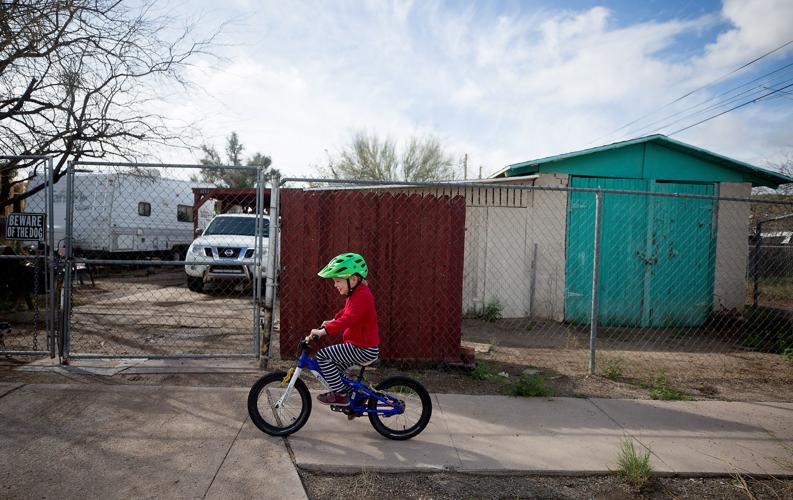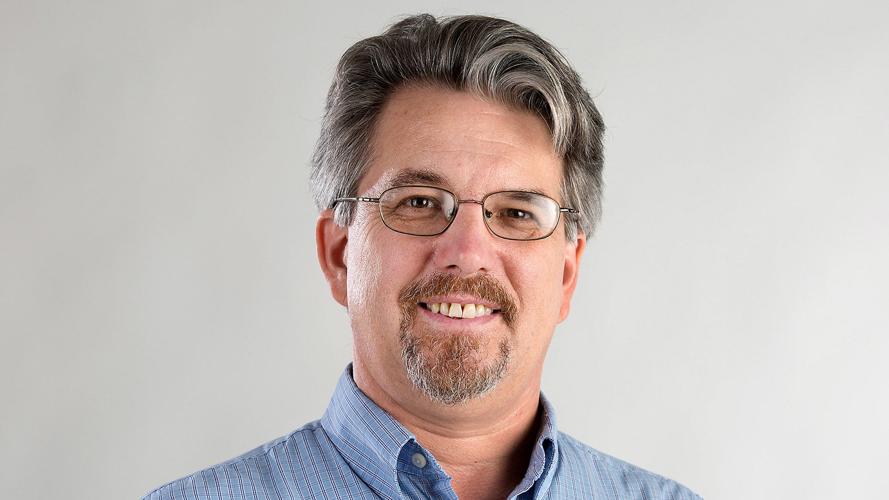Two details stick with me from this shutdown April.
One was the sky — the piercing blue that we usually see only if it rains and cleans the air right before a Sunday or a quiet holiday.
The other was the aroma of the velvet mesquites — 23 years I’ve lived in Tucson, and I’ve never really noticed their subtle sweetness before.
The pandemic and the shutdowns have been devastating for a lot of people, especially those who’ve lost their livelihoods, for people who got sick or for older people unable to see their families.
But it has also been a time of discovery for a lot of people, me included.
“Nature is healing” became a refrain worldwide as animals wandered into places normally occupied by humans who were stuck inside, or as water became cleaner, the night sky full of stars.
It would be a shame to look away from those windows into the possible as we haltingly return to a more normal life.
The most obvious place to start is the streets — at times, neighborhoods all over the Tucson area were filled with more walkers and bicyclists than cars. That’s how I noticed the velvet mesquites, repeatedly walking beneath the same trees through my neighborhood as the spring moved toward summer and catkins filled the mesquites.
Tucson City Council member Lane Santa Cruz noticed the same thing in the Menlo Park neighborhood, where her family lives.
“I have been noticing a lot more families taking walks with their kids, especially in the evenings once the sun isn’t as strong,” she said. “I would sit on my porch and wave as they went by.”
”Having less traffic on the road made it easier for folks to do that,” added Santa Cruz, a bicycle advocate. “This has really shifted the way we think about our streets and our roads and having it be more public use than just being for cars.”
She and fellow council members are seeking some longer-term changes that would make that feeling of quarantine last, at least on some streets at some times. The Slow Streets initiative started with putting up barricades on North Fourth Avenue between East Speedway and East Grant Road that warned the streets were for local traffic only.
”Pollution levels are going down,” council member Steve Kozachik said. “Let’s encourage people to get out.”
The Slow Streets pilot program next moved to Barrio Sin Nombre, a small neighborhood at the base of “A” Mountain. The next step in the experiment is set for an as-yet-unselected street in Ward 5 on the city’s south side.
Kozachik would like to go further, at least during the pandemic restrictions on restaurants and some other businesses. He’d like to see traffic stopped altogether on some downtown streets to let restaurants and pedestrians take over the pavement, perhaps putting out big tents for distanced dining.
”Let’s shut down Congress or Pennington or Scott,” he said.
He would also like to see restaurants elsewhere be able to expand service into their parking lots while distance requirements keep the number of customers limited inside. Pima County has already relaxed rules to allow for this.
The shutdown’s benefits haven’t just been on the streets, but also in the hearts and minds of some people. You wouldn’t expect that of people like Danielle and Jim Rushford. Their Sahuarita family of five has been under strain since Jim went on strike against Asarco on Oct. 13.
”Needless to say, we were all stressed and worried and didn’t know what the future held,” Danielle Rushford told me in a written message. “Then coronavirus hit. It scared us but it was like the gift you never knew you wanted ... needed. The five of us stopped our lives and spent more quality time with each other.”
”We learned a few new things we never had time for. We ate better, exercised, talk more, laughed, and love the slowness of each day.”
As another person put it, “Turns out that ‘being busy’ is vastly overrated.”
What has really helped for thousands of white-collar workers is the ability to telework. Rushford already had been working from home, as a coding manager for emergency rooms in various states. But for many others it was new, and the experience may continue.
When I asked Amber Smith, president of the Tucson Metropolitan Chamber of Commerce, what businesses have learned that they might do differently, she cited “the need for less office space.”
Those who doubted have learned people can telework, from home or elsewhere, “and do their job well,” she said. That removes traffic and cuts down pollution as well as saving commuting time.
From his perch on Tumamoc Hill, Ben Wilder, the director of the Desert Laboratory, has seen the difference. The noticeably cleaner air allowed him and other employees to see mountain ranges far to the north, he said.
With walkers temporarily banned from the often crowded path up the hill, there were some small changes in wildlife behavior, too, he said.
”Anecdotally, there was definitely more wildlife coming in,” he said. “Especially the squirrels have been way more active.”
Here and around the world, the changes were probably too subtle to declare “nature is healing.” But it showed, as author and former Tucsonan Alan Weisman said, “nature is still there despite all of our crushing presence.”
While still living here, Weisman wrote a book, published in 2007, called “The World Without Us.” In it, he traveled to interesting places around the globe to explore how nature would take over the human-dominated world if, for whatever reason, we suddenly disappeared. He’s been getting a lot of calls from people excited by the return of nature during the shutdowns.
”For all the havoc we have wreaked in this battle royal, nature is still very present,” he said by phone from Massachusetts, where he lives now. “It’s hovering on the fringes. The minute we relax our onslaught, it will rush in. People are being comforted by that.”
Weisman doesn’t think that small changes in our behavior like increasing telework can rebalance the human-nature relationship. He’s convinced that we need to reduce our population and consumption patterns for that to happen. That’s a much more challenging proposal.
But for people not desperately getting by in this period, the shutdowns showed a glimpse of what’s possible — in our relationships with ourselves, each other and nature. We ought to hold onto that.
Photos: Flags placed on graves at Tucson cemetery for Memorial Day
Memorial Day flags
Updated
Jaime Aviles, who served in the U.S. Navy from 1974-79, places American flags on the graves of military veterans for Memorial Day at Evergreen Cemetery, 3015 N. Oracle Road, Tucson, on May 23, 2020. Aviles and wife Cathy joined other members of the American Legion and Veterans of Foreign Wars to honor nearly 9,000 veterans buried at Evergreen Cemetery. Aviles' father served aboard the famous aircraft carrier USS Lexington in World War II. His brother and uncles served in Vietnam, Korea and World War II. Aviles' son is a U.S. Navy commander and graduate of Canyon del Oro High School and the U.S. Naval Academy.
Memorial Day flags
Updated
Jaime Aviles, right, who served in the U.S. Navy from 1974-79, along with wife Cathy Aviles, places American flags on the graves of military veterans for Memorial Day at Evergreen Cemetery, 3015 N. Oracle Road, Tucson, on May 23, 2020. They joined other members of the American Legion and Veterans of Foreign Wars to honor veterans who have died.
Memorial Day flags
Updated
Bob Crawford, who served in the U.S. Navy from 1963-91, dusts off a grave marker as Bill Garris, U.S. Air Force, 1966-70, places American flags on the graves of military veterans for Memorial Day at Evergreen Cemetery, 3015 N. Oracle Road, Tucson, on May 23, 2020.
Memorial Day flags
Updated
American flags on the graves of military veterans for Memorial Day at Evergreen Cemetery, 3015 N. Oracle Road, Tucson, on May 23, 2020.
Memorial Day flags
Updated
Bill Garris of American Legion Post 132, who served in the U.S. Air Force from 1966-70, carries American flags to place on the graves of military veterans for Memorial Day at Evergreen Cemetery, 3015 N. Oracle Road, Tucson, on May 23, 2020.
Memorial Day flags
Updated
Bill Garris, left, and Bob Crawford, of American Legion Post 132, place American flags on the graves of military veterans for Memorial Day at Evergreen Cemetery, 3015 N. Oracle Road, Tucson, on May 23, 2020.
Memorial Day flags
Updated
Members of the American Legion place American flags on the graves of military veterans for Memorial Day at Evergreen Cemetery, 3015 N. Oracle Road, Tucson, on May 23, 2020.
Memorial Day flags
Updated
Members of the American Legion place American flags on the graves of military veterans for Memorial Day at Evergreen Cemetery, 3015 N. Oracle Road, Tucson, on May 23, 2020.
Memorial Day flags
Updated
American flags on the graves of military veterans for Memorial Day at Evergreen Cemetery, 3015 N. Oracle Road, Tucson, on May 23, 2020. The Veterans of Foreign Wars and American Legion placed nearly 9,000 flags at veterans' graves at the cemetery.







